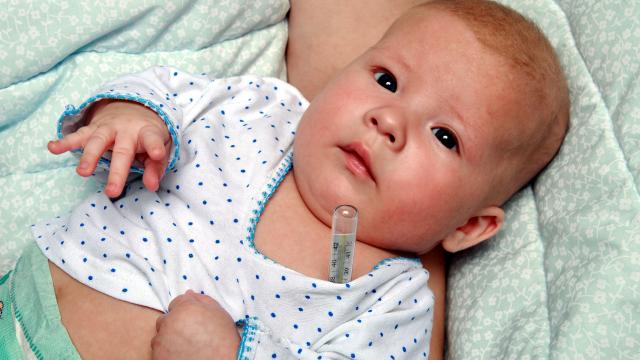


UTIs or urinary tract infections are quite common in children. They occur when germs or bacteria enter into the kidneys or bladder. A baby suffering from UTI may show symptoms of fever or vomiting or become fussy. Older children may develop symptoms of fever, pain while passing urine, frequent urination and lower abdominal pain. Children suffering from UTI should visit a physician as a UTI does not get cured on its own. However, treatment for urine infection in child is easy and it generally goes away in a week with proper treatment.

The only symptom present is unexplained fever in many children. Around 5% of kids who have unexplained fever are suffering from a UTI.
In some cases, other symptoms may be present including:
UTIs in young children and infants should be evaluated and treated promptly. Visit your physician within 24 hours in case your kid has the following:
Call your physician if your child’s symptoms are not getting better 48 hours after beginning an antibiotic.
Initial Treatment
Young children and infants with UTI require prompt treatment to prevent damage to kidneys. The initial treatment decision of your physician is likely based on the symptoms of your child and the result of urinalysis. Most children need home care and oral antibiotics for treatment of a UTI.
If your kid is less than 3 months, is having too much nausea or unable to consume oral medication, or has a suppressed immune system, then your physician may give your kid an antibiotic shot. Or your kid may require staying in the hospital for a brief period of time along with a short course of IV (intravenous) antibiotics. After the symptoms of your kid are better, he or she may be prescribed oral antibiotics.
The total number of days your child will require taking the drugs depends on the age of your child, nature of illness and the kind of antibiotic used.
Home Treatment for Urine Infection in Child
Beginning home treatment as the initial symptoms of a UTI appear in your kid may prevent the illness from getting aggravated and clear up the infection faster.
Encourage your kid to drink more fluids as soon as the initial symptoms of UTI appear. This will aid in reducing the concentration of urine and remove the bacteria from your kid’s system. Most of the physicians recommend drinking lots of fluids while having a UTI. Avoid giving your kid carbonated or caffeinated beverages, which may cause irritation of the bladder. Encourage your kid to pass urine often and to completely empty their bladder.
Note: Remember that you should not substitute home treatment for professional evaluation and care. In case your kid’s symptoms resemble a UTI, you should take him or her to a physician immediately.
Treatment for Urine Infection in Child If the Infection Recurs or Gets Worse
If your kid’s UTI is not improving after taking antibiotics, then they may require further evaluation and more antibiotics to treat the condition. Your kid may be suffering from a structural problem, which is preventing treatment of the infection. Or the infection may be caused by a different type of microorganism than the usual bacteria that cause UTIs.
Your kid may require hospitalization if the infection is spread to kidneys affecting their function or if there is development of sepsis (widespread infection). Though rare, these complications are very serious. Children who have suppressed immunity, untreated obstructions of the urinary tract and other disorders that may affect the bladder or kidneys are more prone to develop complications.
The risk of developing high blood pressure and kidney damage is increased due to recurrent UTIs. Your child may be prescribed a preventive antibiotic after the first UTI is treated if he or she suffers from a structural problem including vesicoureteral reflux, in which the risk of recurrent infections is increased or if your kid has recurrent episodes of UTIs in six to twelve month duration.
Children suffering from structural problem that is causing severe, repeated infections and increasing the risk of developing long-term complications may benefit from surgery. For example, children suffering from vesicoureteral reflux (severe) benefit greatly from surgery.
Some children may be prone to develop UTIs, but there are few things that you can do to reduce the risk of UTI: